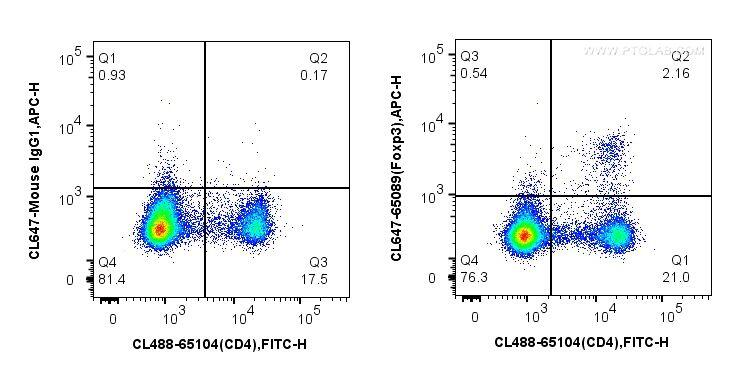- Featured Product
- KD/KO Validated
CoraLite®647-conjugated COXIV Polyclonal antibody
COXIV Polyclonal Antibody for FC (Intra)
Host / Isotype
Rabbit / IgG
Reactivity
human, mouse, rat
Applications
FC (Intra)
Conjugate
CoraLite® Plus 647 Fluorescent Dye
Cat no : CL650-11242
Synonyms
Validation Data Gallery
Tested Applications
Recommended dilution
| Application | Dilution |
|---|---|
| Sample-dependent, check data in validation data gallery | |
Product Information
CL650-11242 targets COXIV in FC (Intra) applications and shows reactivity with human, mouse, rat samples.
| Tested Reactivity | human, mouse, rat |
| Host / Isotype | Rabbit / IgG |
| Class | Polyclonal |
| Type | Antibody |
| Immunogen | COXIV fusion protein Ag1640 相同性解析による交差性が予測される生物種 |
| Full Name | cytochrome c oxidase subunit IV isoform 1 |
| Calculated molecular weight | 19.6 kDa |
| Observed molecular weight | 17-18 kDa |
| GenBank accession number | BC021236 |
| Gene symbol | COX4I1 |
| Gene ID (NCBI) | 1327 |
| RRID | AB_2920368 |
| Conjugate | CoraLite® Plus 647 Fluorescent Dye |
| Excitation/Emission maxima wavelengths | 654 nm / 674 nm |
| Form | Liquid |
| Purification Method | Antigen affinity purification |
| Storage Buffer | PBS with 50% Glycerol, 0.05% Proclin300, 0.5% BSA, pH 7.3. |
| Storage Conditions | Store at -20°C. Avoid exposure to light. Aliquoting is unnecessary for -20oC storage. |
Background Information
COX4I1, also named as COX4 and COXIV-1, belongs to the cytochrome c oxidase IV family. It is one of the nuclear-coded polypeptide chains of cytochrome c oxidase, the terminal oxidase in mitochondrial electron transport. COX4I1 is a marker for mitochondria. It has two isoforms (isoform 1 and 2). Isoform 1(COX4I1) is ubiquitously expressed and isoform 2 is highly expressed in lung tissues. COX4I1 is commonly used as a loading control. This antibody was generated against full length COX4I1 protein and cross reacts with COX4I2.
Protocols
| Product Specific Protocols | |
|---|---|
| FC protocol for CL Plus 647 COXIV antibody CL650-11242 | Download protocol |
| Standard Protocols | |
|---|---|
| Click here to view our Standard Protocols |


